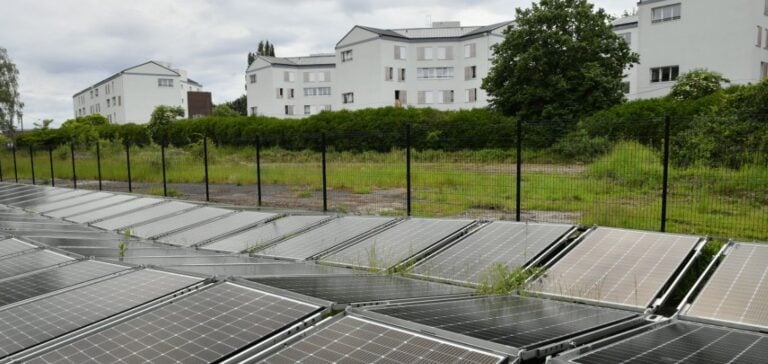A mobile solar power plant is installed on a wasteland in Lille to supply renewable energy directly to social housing located just a few meters away. This pioneering project in France has been up and running since May 23, occupying a 500 m² plot on former SNCF sports grounds. Loris Poidvin, Director of Development and Assets at ICF Habitat Nord-Est, explains that this plant makes it possible to use sites undergoing change to produce decarbonated electricity, thus avoiding costly structural reinforcements on building roofs. The energy produced by the power station supplies the common areas of a 156-unit residence. Part of this production is also fed into the public electricity grid. Quentin Bocquet, President of Enercoop Hauts-de-France, points out that this project enables mobile collective self-consumption, without intermediaries, a first in the country.
Impact and energy production
The residence’s common areas, such as ventilation, lighting and elevators, consume around 74 MWh per year. The solar power plant produces around 58 MWh per year, of which 30 MWh is consumed by the residence and 28 MWh is fed into the public grid. Pierre Gouëllo, energy manager at Enercoop, points out that the plant, which will operate until 2026, is equivalent to the electricity needed for around 11 homes a year, and avoids greenhouse gas emissions comparable to a round trip between Paris and New York. Lille city councillor Audrey Linkenheld is delighted with this investment of almost 200,000 euros, which is part of the city’s efforts to promote renewable energy and reduce its carbon footprint. This project could serve as a model for other similar initiatives in France.
Challenges and prospects
The mobile solar power plant offers a number of advantages, including flexibility and efficient use of fallow land. However, it also poses technical and logistical challenges, particularly in terms of maintenance and connection to the public electricity grid. The success of this project could encourage other cities to adopt similar solutions to improve their energy independence and reduce energy costs for residents. The collaboration between ICF Habitat Nord-Est and Enercoop Hauts-de-France demonstrates the importance of partnerships between public and private players in the energy transition. By developing innovative, sustainable projects, these organizations contribute to the fight against climate change and the promotion of renewable energies.
The Lille mobile solar power plant is a concrete example of innovation in the renewable energy sector. It not only provides clean electricity for social housing, but also demonstrates the benefits of collective self-consumption and the flexible use of wasteland. This pioneering project could inspire other similar initiatives in France and abroad, reinforcing the global commitment to a sustainable energy transition.






















